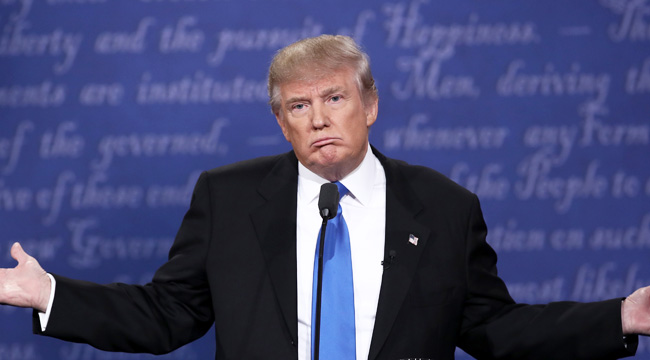
After the New York Times revealed this weekend that Donald Trump declared a federal adjusted gross income of minus $915 million in 1995, Trump exclaimed on Twitter that “I know our complex tax laws better than anyone who has ever run for president and am the only one who can fix them.”
In other words, Trump is acknowledging that there’s something wrong with our tax system, and that he’s exploited it to pay as little in taxes as possible.
Just as Franklin D. Roosevelt appointed John F. Kennedy’s father, Joseph, as the first head of the Securities and Exchange Commission because “it takes a thief to catch a thief,” Trump implies he’ll now use his past expertise in evading taxes to stop others from doing it in the future.
The problem here is that Trump’s own tax plan does nothing to close the loopholes he likely uses.
Of course, there’s no way to know for sure how Trump’s dodged taxes, since he refuses to release his tax returns. And there’s no way to know for sure what Trump’s tax plan is, because has has provided so few details. (The conservative Tax Foundation was so uncertain about what Trump intends that it could only conclude that his scheme would reduce federal revenue by somewhere between $4.4 and $5.9 trillion — a range of $1.5 trillion.)
But it is possible to make educated guesses. We’ll start with how he dodged taxes.
As it happens, there’s nothing wrong in principle with a businessperson using net operating losses from one year to offset gains in other years, thereby reducing or eliminating their tax bill. Otherwise a business with large losses in some years and large profits in others might have to pay much more in taxes than another business that was equally profitable overall during the same period of time but never suffered losses.
The issue with Trump and taxes is that his net operating losses should reflect genuine, out-of-pocket costs to him. If they didn’t, he was able to use false losses to avoid real taxes.
David Cay Johnston, probably the most accomplished tax reporter in America, believes that this is what happened:
Trump’s casino business in Atlantic City was a spectacular catastrophe by the early 1990s. This is likely the ultimate source of most of the $915 billion loss declared on his 1995 return.
Meanwhile, Trump had taken out loans worth $3 billion that he would never be able to repay. Fortunately for Trump, he was able to force his bankers to bail him out by forgiving almost $1 billion of the $3 billion.
Forgiven loans are legally taxable income. In this case, Trump’s nearly $1 billion in losses should have canceled out the nearly $1 billion in forgiven loans — leaving him no losses to cancel out future income and thereby avoid taxes.
However, Congress created a special loophole in the mid-nineties that let real estate developers exchange the tax liability on forgiven debt for reduced tax depreciation allowances on their property in the future. That would mean that Trump could keep his losses for use later, at the cost of increasing his tax bill in the future (since his casinos would have to pay higher taxes due to their reduced depreciation exemptions).
But in 1995, Trump created a company called Trump Hotels and Casino Resorts, and sold stock in it. And Trump Hotels and Casino Resorts became the legal owner of his casinos, not Trump himself. So, Johnston believes, Trump kept the upside (i.e., the losses he could use to cancel out future income and avoid taxes) while transferring the downside (the more heavily-taxed casino property) to the company’s shareholders.
And as far as we can tell, nothing would stop other businessmen doing this under President Trump.
His tax plan appears to change neither the principle of losses cancelling out future profits, nor the ability of real estate developers to swap current tax liabilities for reduced future depreciation.
Just as importantly, Trump shows no sign that he believes the government should protect shareholders from ruthless businessmen willing to screw them. In fact, just the opposite — his core belief is that we need to get the government off the backs of long-suffering entrepreneurs like himself.
The post It Takes a Remorseful Tax Cheat to Catch a Tax Cheat, and Donald Trump Isn’t appeared first on The Intercept. Sign up for The Intercept Newsletter here.

